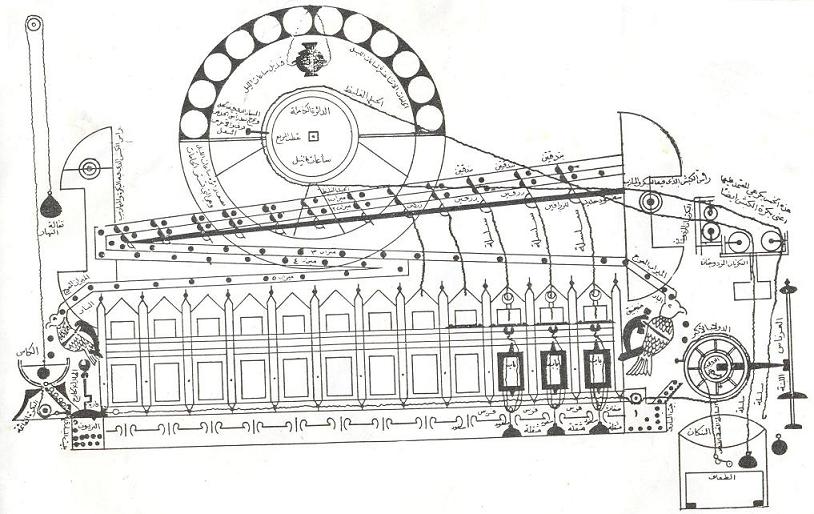Riḍwān Ibn Al-Sāʿātī on:
[Wikipedia]
[Google]
[Amazon]
 Fakhr al-Dīn Riḍwān ibn Muḥammad ibn ʿAlī ibn Rustam al-Khurāsānī al-Sāʿātī ar, فخر الدين رضوان بن محمد بن علي بن رستم الخرساني الساعاتي (died c. 1230), called Ibn al-Sāʿātī (son of the clockmaker), was a
Fakhr al-Dīn Riḍwān ibn Muḥammad ibn ʿAlī ibn Rustam al-Khurāsānī al-Sāʿātī ar, فخر الدين رضوان بن محمد بن علي بن رستم الخرساني الساعاتي (died c. 1230), called Ibn al-Sāʿātī (son of the clockmaker), was a
 Fakhr al-Dīn Riḍwān ibn Muḥammad ibn ʿAlī ibn Rustam al-Khurāsānī al-Sāʿātī ar, فخر الدين رضوان بن محمد بن علي بن رستم الخرساني الساعاتي (died c. 1230), called Ibn al-Sāʿātī (son of the clockmaker), was a
Fakhr al-Dīn Riḍwān ibn Muḥammad ibn ʿAlī ibn Rustam al-Khurāsānī al-Sāʿātī ar, فخر الدين رضوان بن محمد بن علي بن رستم الخرساني الساعاتي (died c. 1230), called Ibn al-Sāʿātī (son of the clockmaker), was a Syrian
Syrians ( ar, سُورِيُّون, ''Sūriyyīn'') are an Eastern Mediterranean ethnic group indigenous to the Levant. They share common Levantine Semitic roots. The cultural and linguistic heritage of the Syrian people is a blend of both indi ...
Muslim
Muslims ( ar, المسلمون, , ) are people who adhere to Islam, a monotheistic religion belonging to the Abrahamic tradition. They consider the Quran, the foundational religious text of Islam, to be the verbatim word of the God of Abrah ...
physician, government official and writer.
Riḍwān's father, Muḥammad, was a native of Khorasan
Khorasan may refer to:
* Greater Khorasan, a historical region which lies mostly in modern-day northern/northwestern Afghanistan, northeastern Iran, southern Turkmenistan, Tajikistan, and Uzbekistan
* Khorasan Province, a pre-2004 province of Ira ...
who moved to Damascus
)), is an adjective which means "spacious".
, motto =
, image_flag = Flag of Damascus.svg
, image_seal = Emblem of Damascus.svg
, seal_type = Seal
, map_caption =
, ...
, where Riḍwān was born. Riḍwān's brother, Bahāʿ al-Dīn ibn al-Sāʿātī, became a famous poet.
Muḥammad was a ''muwaqqit
In the history of Islam, a ''muwaqqit'' ( ar, مُوَقَّت, more rarely ''mīqātī'') was an astronomer tasked with the timekeeping and the regulation of prayer times in an Islamic institution like a mosque or a madrasa. Unlike the mue ...
'' trained in clockmaking and astronomy who was commissioned by the Emir Nūr al-Dīn (1156–1174) to construct the water clock at the Jayrūn Gate by the entrance of the Umayyad Mosque in Damascus. Riḍwān also learned clockmaking and wrote a book in Arabic on his father's clock and the repairs and improvements he made to them, ''Risāla fī ʿamal al-sāʿāt wā-ʾstiʿmālihā''. This work he finished in 1203, after his father's death. Although overlong and redundant, it provides details of manufacture not typically found in such treatises. It also provides evidence for the exchange of horological ideas between the Hellenistic
In Classical antiquity, the Hellenistic period covers the time in Mediterranean history after Classical Greece, between the death of Alexander the Great in 323 BC and the emergence of the Roman Empire, as signified by the Battle of Actium in ...
world and Sasanian Iran. It has been abridged and translated into German.
Called Ibn al-Sāʿātī on account of his father, Riḍwān studied medicine, literature, logic and philosophy on top of clockmaking. He wrote commentaries on the '' Canon of Medicine'' and the ''Book of Colic'' of Ibn Sīnā. He became a practising physician, and served as the vizier of al-Malik al-Fāʾiz, son of the Sultan al-ʿĀdil I, and afterwards of his brother, al-Malik al-Muʿaẓẓam, emir of Damascus (1218–1227), whom he also served as a physician. According to Yāqūt al-Rūmī
Yāqūt Shihāb al-Dīn ibn-ʿAbdullāh al-Rūmī al-Ḥamawī (1179–1229) ( ar, ياقوت الحموي الرومي) was a Muslim scholar of Byzantine Greek ancestry active during the late Abbasid period (12th-13th centuries). He is known f ...
, Ibn al-Sāʿātī loved music and poetry. He could play the lute
A lute ( or ) is any plucked string instrument with a neck and a deep round back enclosing a hollow cavity, usually with a sound hole or opening in the body. It may be either fretted or unfretted.
More specifically, the term "lute" can ref ...
and he collected works of Arabic poetry
Arabic poetry ( ar, الشعر العربي ''ash-shi‘ru al-‘Arabīyyu'') is the earliest form of Arabic literature. Present knowledge of poetry in Arabic dates from the 6th century, but oral poetry is believed to predate that.
Arabic poetry ...
into a book, the ''Kitāb al-Muhtārāt''. He died at Damascus around 1230. Yāqūt, however, places his death in 1221.
Notes
Bibliography
* * * * * * {{refend People from Damascus 12th-century births 13th-century deaths 13th-century Arabic writers Medieval Syrian physicians